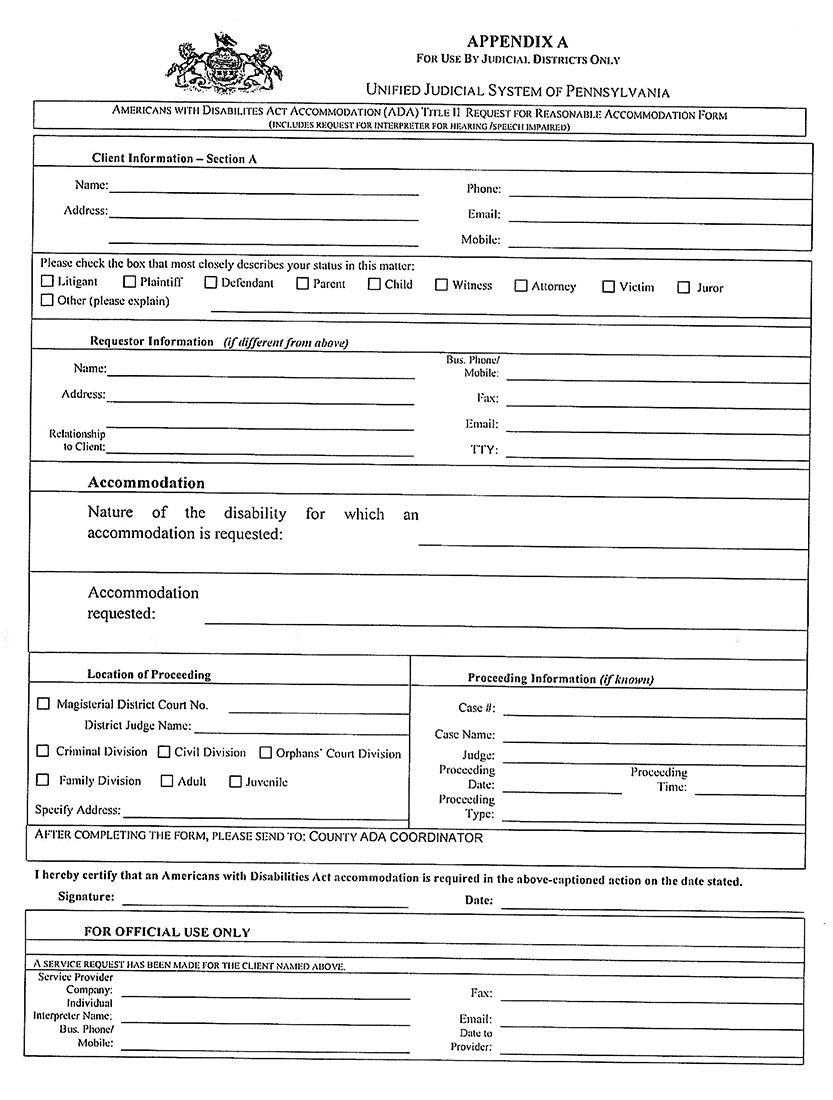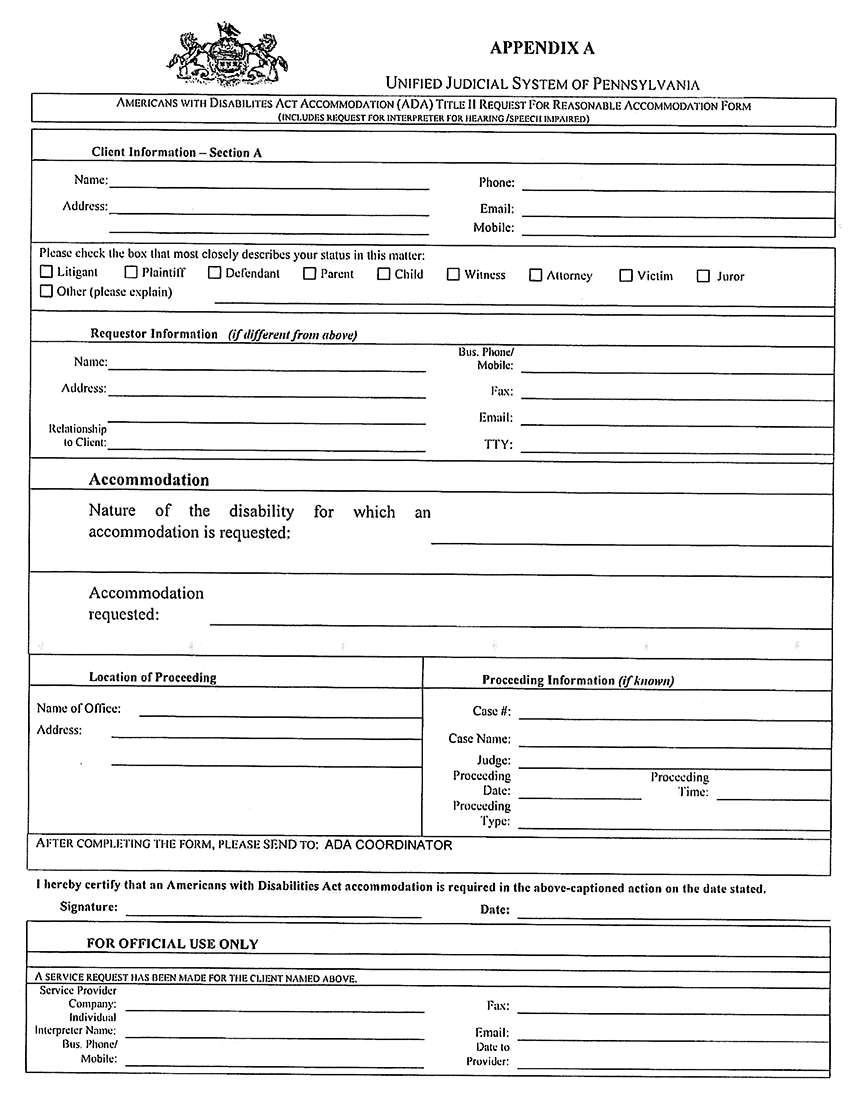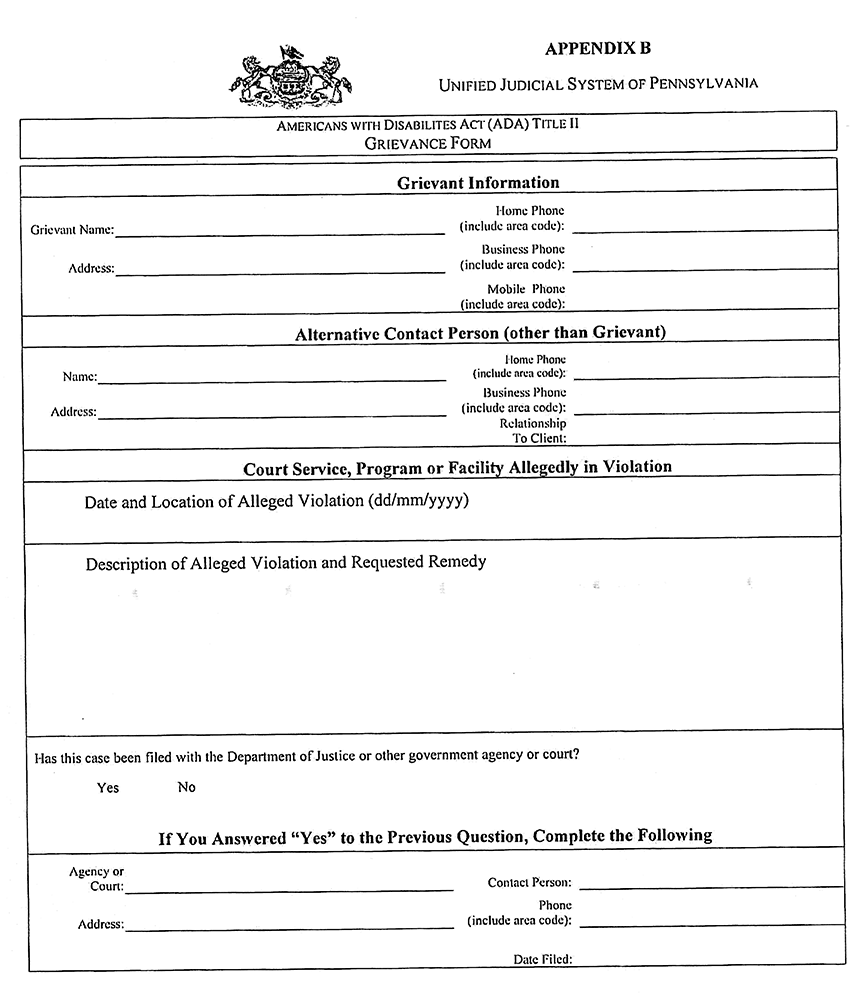THE COURTS
Title 201—RULES OF JUDICIAL ADMINISTRATION
[ 201 PA. CODE CH. 2 ]
Promulgation of Rules of Judicial Administration 250—252; Reasonable Accommodations under Title II of the Americans with Disabilities Act; No. 422 Judicial Administration Doc.
[44 Pa.B. 1419]
[Saturday, March 15, 2014]
Order Per Curiam:
And Now, this 3rd day of March, 2014, the proposal having been submitted without publication in the interests of justice and efficient administration, It Is Ordered pursuant to Article V, Section 10 of the Constitution of Pennsylvania that Pennsylvania Rules of Judicial Administration 250, 251, and 252 are promulgated as follows.
This Order shall be processed in accordance with Pa.R.J.A. No. 103(b) and shall be effective immediately.
Annex A
TITLE 201. RULES OF JUDICIAL ADMINISTRATION
CHAPTER 2. POLICY ON NONDISCRIMINATION AND EQUAL EMPLOYMENT OPPORTUNITY
REASONABLE ACCOMMODATIONS UNDER
TITLE II OF THE AMERICANS WITH DISABILITIES ACTRule 250. Policy.
It is the policy of the Unified Judicial System to prohibit discrimination against any individual with a disability, as defined by the Americans with Disabilities Act (''ADA''), 42 U.S.C. § 12131 et seq., in accessing or participating in judicial proceedings or other services, programs, or activities of the Unified Judicial System.
Rule 251. Scope.
These rules shall apply to each UJS entity which includes, but is not limited to, all appellate courts, judicial districts, boards, committees and agencies under the administrative authority of the Supreme Court. These rules relating to reasonable accommodations under Title II of the ADA do not supersede either the requirements of 42 Pa.C.S.A. § 4401 et seq., relating to Court Interpreters for Persons who are Deaf or Hard of Hearing, or the Administrative Regulations Governing Court Interpreters for Persons who are Deaf or Hard of Hearing.
Official Note: The Administrative Regulations Governing Court Interpreters for Persons who are Deaf or Hard of Hearing (204 Pa. Code § 101 et seq.) and 42 Pa.C.S.A. § 4401 et seq. provide standards for court interpreters in judicial proceedings. ''Judicial proceeding'' is defined as ''an action, appeal or proceeding in any court of this Commonwealth.'' 2 Pa.C.S. § 101. Title II of the ADA requires an interpreter for the deaf or hard of hearing for all programs, services or activities of the UJS. 42 U.S.C.A. § 12132; 28 C.F.R. § 35.160.
Rule 252. Reasonable accommodations.
A. Each UJS entity shall develop a written policy to receive and process requests for reasonable accommodations from individuals with disabilities. The policy shall be posted on each UJS entity's respective website and in each facility.
B. All policies developed must be substantially similar to the policy appended to this Rule (Appendix A) and shall contain, at a minimum, the following elements:
1. Appointment of an ADA coordinator—the coordinator must be identified on all court or program materials and the following information shall be provided: the coordinator's name, work address, work fax number or e-mail address and work telephone number.
2. Notice of the right to request free accommodation(s).
3. Explanation of the process for requesting accommodation(s).
4. Time line for request and response.
C. Each UJS entity shall develop a form substantially similar to the one appended to this rule (Appendix A) for processing requests for reasonable accommodations.
D. Each UJS entity shall adopt and publish a grievance procedure, substantially similar to the procedure appended to this rule (Appendix B), for requests that have been denied in whole or in part. Any denial of an accommodation request based upon undue burden or fundamental alteration to services and programs shall be put in writing by the head of the entity or his or her designee and shall provide specific reasons for the denial.
E. Within six (6) months of the adoption of this rule, each UJS entity shall provide the Administrative Office with a copy of their ADA policy and form and their grievance procedure and form as outlined in sections A—D above.
Appendix A
AMERICANS WITH DISABILITIES ACT (TITLE II) POLICY The Unified Judicial System of Pennsylvania (UJS) complies with Title II of the Americans with Disabilities Act (ADA) which provides that ''no qualified individual with a disability shall, by reason of such disability, be excluded from participation in or be denied the benefits of the services, programs, or activities of a public entity, or be subjected to discrimination by any such entity''. 42 U.S.C.A. § 12132. Pursuant to that requirement, if you are an individual with a disability who needs an accommodation in order to participate in any judicial proceeding or any other service, program, or activity of the UJS, you are entitled, at no cost to you, to the provision of certain assistance. The ADA does not require the (UJS entity name here) to take any action that would fundamentally alter the nature of its programs or services, or impose an undue financial or administrative burden.
If you require an accommodation under the ADA, it is recommended that you make your request as soon as possible or at least three (3) business days before your scheduled participation in any court proceeding or UJS program or activity. All requests for accommodation, regardless of timeliness, will be given due consideration and if necessary, may require an interactive process between the requestor and the (name of UJS entity) to determine the best course of action.
To request a reasonable accommodation, please complete the Request for Reasonable Accommodation Form (Appendix B) and return it to:
Name(s), Business Address(es), Fax Number(s) and / or e-mail address(es), Telephone Number(s) of the ADA Coordinator
If you need assistance completing this form, contact the ADA Coordinator. Complaints alleging violations of Title II under the ADA may be filed pursuant to the UJS Grievance Procedure with (name and contact information of individual who handles grievance procedures). A response will be sent to you after careful review of the facts.








Appendix B
Americans with Disabilities Act (Title II)
Grievance ProcedureThis grievance procedure is established for the prompt resolution of complaints alleging any violation of Title II of the Americans with Disabilities Act (ADA) in the provision of services, programs, or activities by the Unified Judicial System (UJS). If you require a reasonable accommodation to complete this form, or need this form in an alternate format, please contact [ADA coordinator information].
To file a complaint under the Grievance Procedure please take the following steps:
1. Complete the complaint form and return to [ADA Coordinator or designated individual]. Alternative means of filing complaints will be made available for persons with disabilities upon request. The complaint should be submitted as soon as possible but no later than sixty (60) calendar days after the alleged violation.
2. Within fifteen (15) calendar days of receipt of the complaint, the [ADA Coordinator or designated individual] will investigate the complaint, including, meeting with the individual seeking an accommodation, either in person or via telephone, to discuss the complaint and the possible resolutions. Within fifteen (15) calendar days of the meeting, the [ADA Coordinator or designated individual] will respond in writing, and where appropriate, in a format accessible to the complainant, such as large print, Braille, or audio. The response will explain the position of the [name of UJS entity] and offer options for substantive resolution of the complaint.
3. If the response to the complaint does not satisfactorily resolve the issue, the complainant may appeal the decision within fifteen (15) calendar days after receipt of the response to [designated individual]. Within fifteen (15) calendar days after receipt of the appeal, the [designated individual] will meet with the complainant to discuss the complaint and possible resolutions. Within fifteen (15) calendar days after the meeting, the [designated individual] will respond in writing, and, where appropriate, in a format accessible to the complainant, with a final resolution of the complaint.
This grievance procedure is informal. An individual's participation in this informal process is completely voluntary. Use of this grievance procedure is not a prerequisite to and does not preclude a complainant from pursuing other remedies available under law.
The UJS Policy on Non-Discrimination and Equal Employment Opportunity also encompasses disability-related issues and provides complaint procedures for UJS court users. Any employment-related disability discrimination complaints will be governed by the UJS Policy on Nondiscrimination and Equal Employment Opportunity.




[Pa.B. Doc. No. 14-507. Filed for public inspection March 14, 2014, 9:00 a.m.]
No part of the information on this site may be reproduced for profit or sold for profit.This material has been drawn directly from the official Pennsylvania Bulletin full text database. Due to the limitations of HTML or differences in display capabilities of different browsers, this version may differ slightly from the official printed version.